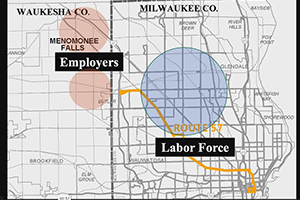UWM faculty and staff members lead a team awarded a $1 million grant from the National Science Foundation to implement a pilot “microtransit” project that they hope makes it easier for residents from segregated city neighborhoods to reach suburban areas with more jobs.
The grant awarded to UWM and the Southeastern Wisconsin Regional Planning Commission was one of 17 given recently as part of the Civic Innovation Challenge, sponsored by the NSF and the U.S. Departments of Energy and Homeland Security.
 Six of the grants, including the one awarded to UWM, were awarded to projects that looked at community-based solutions to close gaps in transport equality. The Milwaukee-area project will test a microtransit model to connect neighborhoods on the northwest side of Milwaukee to business centers in the suburb of Menomonee Falls.
Six of the grants, including the one awarded to UWM, were awarded to projects that looked at community-based solutions to close gaps in transport equality. The Milwaukee-area project will test a microtransit model to connect neighborhoods on the northwest side of Milwaukee to business centers in the suburb of Menomonee Falls.
The Federal Transit Administration defines microtransit as small-scale transit services with flexible scheduling and routes to cater to demand. Microtransit can incorporate ride-booking technology with vehicles ranging from large SUVs to vans to shuttle buses.
Menomonee Falls was selected in part because it used to be the endpoint for a JobLines bus route from Milwaukee. The route operated for four years starting in 2015 until it was discontinued because of a lack of funding.
The Regional Transit Leadership Council, Waukesha County Business Alliance, Waukesha County Center for Growth and Employee Milwaukee also are partners in the Milwaukee-area effort, which arose from a 2020 NSF Planning Grant.
Leading the UWM research contingent are Lingqian (Ivy) Hu and Robert Schneider, urban planning faculty members at the School of Architecture and Urban Planning, and Yaidi Cancel Martinez, associate scientist at the Center for Economic Development.
“We want to thank all partners on this project, who have been doing solid foundational work in our region for years,” Hu said. “The NSF award recognizes the potential impact of our teamwork to address transit and other obstacles that deter marginalized population groups from accessing jobs in the Milwaukee region.”






